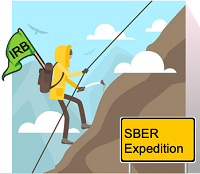The PRIM&R Knowledge Center houses a wide range of resources to keep you inspired and informed in your work in research ethics…
Read MorePRIM&R is pleased to introduce the members of the Blog Squad for our 2021 Social, Behavioral, and Educational Research and…
Read MoreIRBs come in many types, focusing on dramatically different categories of research from Phase I drug research to studies focused…
Read MoreOn March 30, 2021, PRIM&R hosted the webinar “Ominum-Gatherum: An SBER Variety Show.” During this webinar, Tonya Ferraro, MEd, and Andrew Hedrick, MPA, CIP,…
Read MoreI recommend all young professionals attend at least one PRIM&R Conference. As more professionals in our field from previous generations…
Read More




